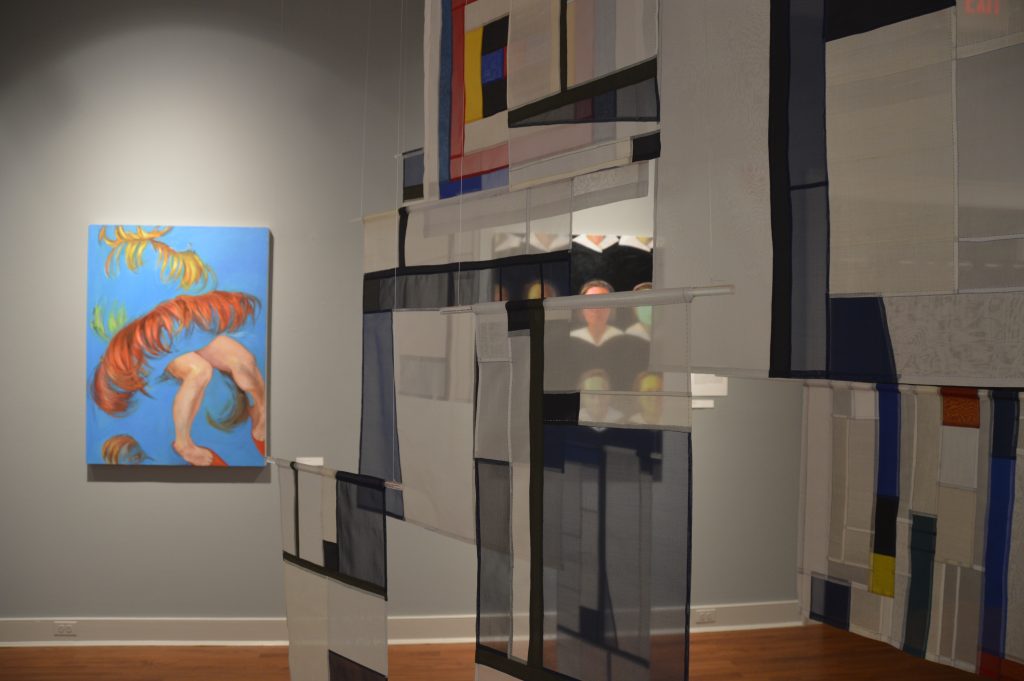Modern Korean women dismantle historical patriarchy through art
3 min read
Metamorphosis of powerful women is a theme throughout the exhibit. (Adam Wartel | The Blue & Gray Press)
By KAITLIN BAILEY
Staff Writer
The Ridderhof Martin Gallery’s most recent exhibition, “Marginalized Histories of Korean Women” had its grand opening last week on Oct 24. The art illustrates the daily life of Korean women throughout history beginning in 1910 and continuing into the 1980s. It focuses on the ignored histories of women that contradict conventional values of marriage and family including messages of political regimes.
The exhibit features four contemporary Korean artists: Youngjoo Cho, Sohee Kim, Sumita Kim, and Wonju Seo.
Suzie Kim, curator of the exhibition and professor of art history at UMW, said that their art “epitomizes the intersection of personal and collective histories of Korean women, and illustrates contemporaneous conversations against militarism, patriarchy and nationalism.”
These inspiring female artists put new perspectives on Korean gender roles and show a variety of ways women have overcome obstacles that society has thrown at them during this roughly seventy-five year span through multiple art mediums.
The exhibit showcases the blossoming of individuality and turning away from the standard and traditional female identity through textile and fashion in Korean society that has been rigidly ingrained into the previous generations.
Seo’s 2009 textile piece “Wrapping with Blessings” narrates through cohesive patchwork that it is possible to resolve issues in gender, race and immigration and emerge into a new identity.
In Sumita Kim’s inspiring 2019 oil-on-canvas piece “The Quelling,” she portrays a transformation through self-portraits. She emphasizes the confinement of women during the 1970s and 80s patriarchy based on Confucian ideologies. Her facial expressions are dull and emanate the suppressed feelings of a young girl being held back from being her optimal self.
A common theme throughout the exhibit is a metamorphosis of powerful women emerging into identities greater than just homemakers and caretakers. In Cho’s 2015 piece “Demilitarized Goddess,” she highlights a specific group of women in Korean culture, the “ajumma.” These married, middle-aged women are seen as having little significance to society. Cho created a video which contrasts a group of women dressed beautifully as brides with military scenes.
The brides seen in the video are normal women rather than professional models. While they are beautifully styled and made up, they show physical signs of age and stress which demonstrate the taxing roles women take on in society. This piece shows in a raw sense how women have been previously restrained by societal gender roles and they have the ability to be admired amidst the sacrifices they make as wives and mothers.
This exhibit accurately shows the importance of the growth of feminism in Korea to counteract the patriarchal government and society. It is hard not to support these strong, intelligent female artists who have chosen to openly express their discrepancies with the marginalized histories of their cultures.
The Ridderhof Martin Gallery has given the UMWs community a striking opportunity to appreciate these women’s moving pieces that depict the bleak history of women and the inspiring progress that has been made in promoting feminism and individuality for Korean women in all of the generations moving forward.
The exhibit will be open daily through Dec 8.


